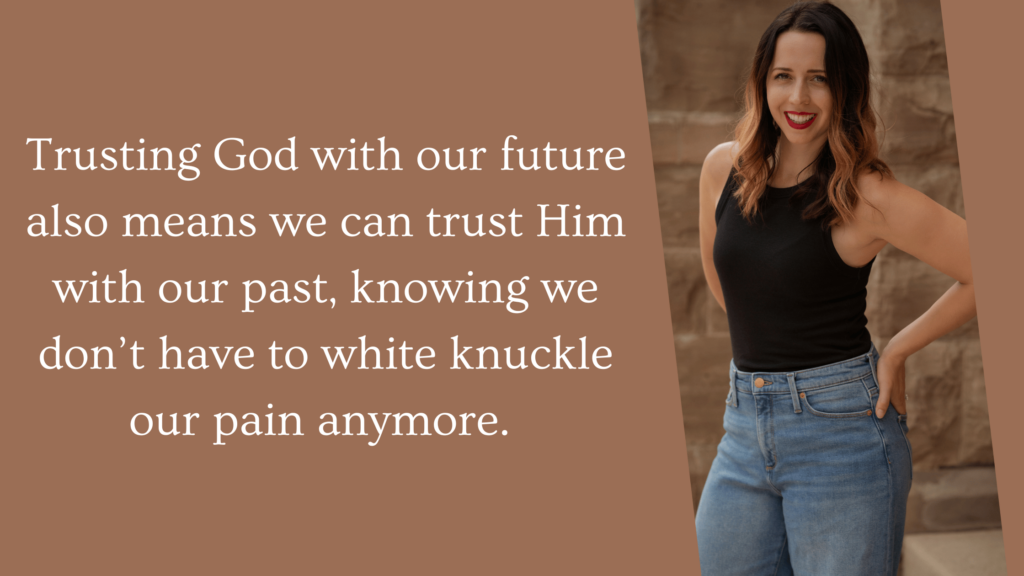Moving forward with God means it’s equally important for us to allow Him to heal us from the pain of our past as well.
I often say to my coaching clients, “We can bury the pain of our past but it doesn’t mean it’s dead.”
Trusting God requires us to walk through our experiences and pain with Him. Sometimes I think we, as believers, shove our pain down and top it off with a great scripture and call it healing.
By the way, what if I told you your feelings aren’t inherently bad or sinful? You don’t need to fear or suppress them. They can be a guide. If you’re interested, I have a free 3-day study on living by faith while processing emotions. Check it out here!
What Does it Mean to Move Forward with God
Moving forward with God typically means progressing in your spiritual journey, deepening your relationship with God, and aligning your life more closely with spiritual principles and values.
Living by faith is another key aspect of moving forward with God. This means trusting in God’s plan and guidance, even when faced with uncertainties and challenges. It involves having faith that God is with you and will help you through difficult times, providing strength and comfort along the way.
Seeking God’s will is a fundamental part of progressing spiritually. This involves actively seeking to understand and follow God’s will in your life, which might include prayer, reflection, and seeking counsel from religious leaders or mentors.
Personal reflection and repentance are essential for spiritual growth. Regularly reflect on your actions and thoughts, seek forgiveness for wrongdoings, and aim to become more like Jesus every day. This ongoing process of self-examination and renewal will help you stay on your spiritual path and continue moving forward with God.
Moving forward with God is about continual growth and improvement in your spiritual life, building a deeper and more meaningful connection with God, and living out the principles of one’s faith in everyday life.
God’s Role in Moving Forward
Scripture was never meant to be a bandage in our life. Merely holding us together. The Word of God, our relationship with Him, provides healing that has side effects of joy, peace, kindness, patience, and gentleness despite if that situation gets brought up again.
Three ways to know our past needs healing and that we are not trusting God:
- When our reaction to our past is as equal as if it’s happening in the present.
- If it’s hard to look at a picture or hear their name without getting angry, bitter, or resentful.
- If we find it hard to pray for them.
We can bury our pain and go on with our lives without ever acknowledging what happened to us. Moving forward doesn’t mean we forget everything.
There’s a difference between dying to our past and burying it alive. This means that we can live in the present through our past pain if we didn’t give it the proper burial.
Trusting God requires us to hand over our offense, forgive, and know He is the one who will provide justice in this life or the next.
Philippians 3:13-14 says, “Brothers and sisters, I do not consider myself yet to have taken hold of it. But one thing I do: Forgetting what is behind and straining toward what is ahead, press on toward the goal to win the prize for which God has called me heavenward in Christ Jesus.”
Some people have misunderstood this verse and taught us that we are to forget everything in the past. That is not what Paul was saying. The Scriptures teach us that memory can be a very powerful force for good in our lives. We see God commanding feasts and specific monuments to be erected in remembrance.
In context, Paul was speaking about forgetting everything he used to trust before his salvation experience. Paul focused only on trusting God and what Christ had done for him.
We have to cultivate our memories by meditating on the great things God has done for us and spoken to us. One memory at a time, one thought at a time, we can have a proper burial for our past that honors God and the people. Moving forward is a slow and steady process.
Paul could well be saying that after we are born again, we will continue to be saved from sickness, depression, fear, etc., as we hold fast to the truths of God’s Word. (Which is certainly true.)
Many would argue since it’s buried (it happened years ago or even a year ago), why go back? It’s in the past, isn’t it?
To which I say, but is it dead to you?
That’s the question.
Clinging to Hope: Moving Forward with God’s Grace After a Painful Past
It’s kind of like trying to shove everything you can into your car before a vacation. Everything is packed in tight, all over the place, and you are hoping to get the trunk shut quickly before anything else falls out. Then when you go to open the trunk, what was packed comes out, falling everywhere.
One person or situation could be the key that opens our trunk, so to speak, and for us to spew everywhere.
Trusting God with our future also means we can trust Him with our past, knowing we don’t have to white knuckle our pain anymore. We don’t have to live in a responsive way to our surroundings. We can keep our feelings in submission with the Word.
Let me ask you this about your pain:
- Did you heal with the Lord?
- Did you bury your pain without properly dying to it, so you don’t live from it?
I’m here to help you recognize that your pain is not a sin. It’s when we live from our pain that we can sin.
Trusting God is more than a feeling; it’s a choice to have faith in what He says, even when your feelings or circumstances would have you believe something different.
Your feelings and circumstances matter. God cares about them both. But those things alone are not reliable enough to base your life on. They can change at any moment, even in an instant. God, on the other hand, does not change. He is the same yesterday, today, and tomorrow; therefore, we know He is trustworthy.
It’s not about convincing ourselves or others we have moved on. Healing is about honesty and humility. Honesty with where we are, and humility in recognizing our need for the Lord.
Trusting God is living a life of belief in and obedience to God even when it’s difficult.
Letting Go and Letting God: Overcoming Your Past
Learning to trust God, move forward, and let go of control is a deeply personal and spiritual journey. Here are some steps that may help you in cultivating trust and surrender:
- Seek knowledge: Take time to learn about your faith and the principles and teachings that guide your belief in God. Engage in scripture study, read spiritual books, and seek guidance from religious leaders or mentors. Understanding the nature of God and His promises can lay a strong foundation for trust.
- Reflect on past experiences: Look back at times when you felt a sense of guidance or provision in your life. Recognize the ways in which things have worked out for your good, even in difficult situations. Reflecting on these experiences can help build trust in God’s faithfulness and His ability to guide you.
- Prayer and meditation: Develop a regular practice of prayer and meditation to deepen your connection with God. This allows you to surrender your worries, fears, and desires to a higher power. Praying for guidance and expressing your trust in God can bring a sense of peace and assurance.
- Surround yourself with a supportive community: Engage with a community of like-minded individuals who share your faith and values. Participate in religious services, join small groups, or seek out spiritual retreats. Connecting with others who are also on a spiritual journey can provide encouragement, accountability, and shared experiences.
- Reflect on the attributes of God: Contemplate the qualities of God that inspire trust, such as His love, wisdom, and compassion. Remind yourself of His infinite power and His desire to guide and support you. Cultivating an understanding of God’s character can strengthen your trust in Him.
Remember, developing trust and letting go is a continuous process that requires patience, practice, and personal introspection. Be gentle with yourself, and allow your faith to deepen over time as you move forward.
Learn more about how to move forward in my program Untangle Your Thoughts or schedule a free consultation to work with me 1:1.






Wonderful write up that bless my soul and teaches simple steps of moving on in faith despite past pains. I pray that Almighty God will bless this ministry, uphold the writer and gives more anointing to function; Amen.
Thank you!